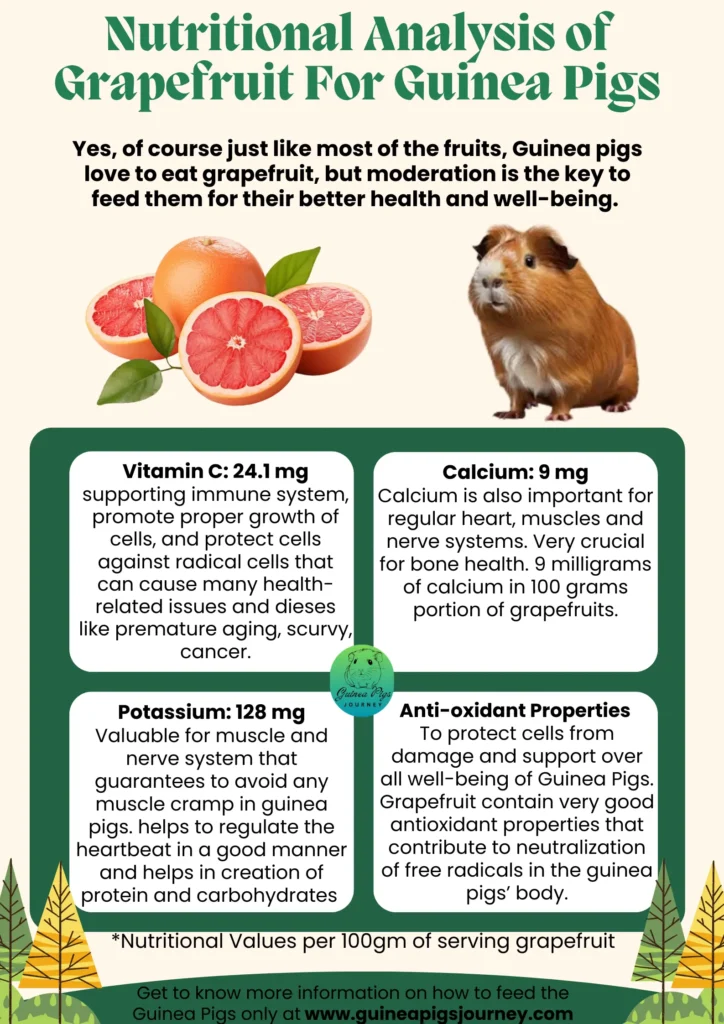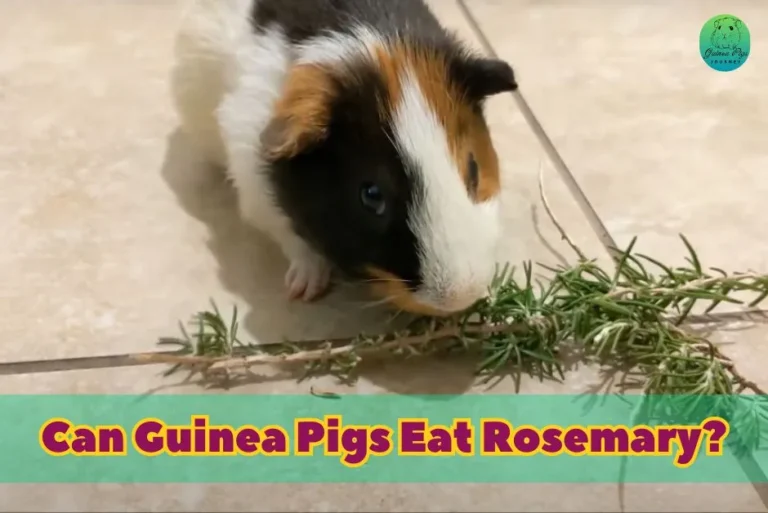Guinea pigs, like other social pets, always thrive on a nutritious diet. Being a responsible pet owner, you are at the right place to be mindful about the right food at the right time for your furry friends. Before introducing new food in guinea pigs’ diet, it is pertinent to know about the benefits and risk factors. After giving proper research, here the question arises:
Can Guinea Pigs Eat Grapefruit?
Yes, of course just like most of the fruits, Guinea pigs love to eat grapefruit, but moderation is the key to feeding them for their better health and well-being.
Grapefruits for guinea pigs would be a delightful addition to their diet as it contains a burst of Vitamin C, Hydration, and some sweetness. The fiber content in grapefruit for guinea pigs promotes the digestive system. However, it is very crucial to provide it in moderation. So, let’s explore the nutritional aspects, potential risks, and guidelines for offering this citrus fruit to your guinea diet.
Guinea Pigs Can Eat Grapefruit, But Do They Like It?
After knowing that Guinea pigs can eat this nutritious fruit, it is also important to know do guinea pigs like grapefruits. Although, guinea pigs love to eat grapefruits, serving grapefruit is the only answer you would come to know if your guinea pig likes it or not because it depends on individual guinea pigs, just give them a little bit of try and observe or monitor them to serve more or stop serving if they show some sign of dislike.
An Overview Of Guinea Pig’s Nutritional Requirements
As we know guinea pigs are herbivores animals, who love to eat fresh vegetables and fruits. Guinea pigs require Vitamin C, fiber, and other essential nutrients for optimal health. Maintaining a balanced diet for guinea pigs is very necessary because overall physical and mental well-being depends on a good diet consisting of nutrients, minerals, and vitamins. A balanced diet would promote digestion, a strong immune system, and overall energy. For this reason, it is pertinent to know here about the nutritional value of grapefruit to consider it as a good treat for your furry friends.
To Read Those Foods Not Recommended To Feed Guinea Pigs Visit Here!
Nutritional Analysis of grapefruits
Grapefruit for guinea pigs is rich in vitamin C content, which is a very important nutrient for their health, as the guinea pig itself could not produce Vitamin C leading to scurvy – a very dangerous disease in guinea pigs. It also offers hydration and a spurt of flavor that is loved by the guinea gang. It is very important first to understand these nutritional aspects before introducing grapefruits into the guinea diet.
It is very crucial to apply the rule of moderation while considering any food including grapefruits in the guinea pig’s menu. This will contribute positively to the health and well-being of your furry friends. Here are some of the nutrients available per 100 grams in grapefruit for guinea pigs.
| Nutrients | Value per 100 grams |
| Water | 89.8 grams |
| Energy | 41 kcal |
| Protein | 0.09 grams |
| Vitamin C | 24.1 milligrams |
| Fat | 0.27 grams |
| Carbohydrates | 9.1 grams |
| Sugar | 7.12 grams |
| Citric Acid | 1080 milligrams |
| Calcium | 9 milligrams |
| Magnesium | 7.7 milligrams |
| Phosphorus | 15 milligrams |
| Potassium | 128 milligrams |
| Dietary Fiber | 0.7 grams |
Rich in Vitamin C: Grapefruit for guinea pigs are the basic source of Vitamin C which is a very important nutrient for guinea pigs, supporting their immune system, promoting proper growth of cells, and protecting cells against the effects of radical cells that can cause many health-related issues and diseases like premature aging, scurvy, cancer. Vitamin C is a good observant of iron that helps in maintaining healthy blood and in particular production of proteins necessary for oxygen transport through the body.
Excellent source of Calcium: Grapefruit for guinea pigs is one of the excellent sources of calcium which is very crucial for bone health, but if you are considering a food to feed to your guinea pig rich in calcium, then you must feed it in moderation because individual needs in guinea pigs are different from each other and it also depends on sex and age conditions and overconsumption may lead to urinary tract issues i.e. calcium deposition or urinary tract infection.
Calcium is also important for regular heart, muscles, and nerve systems. These all are interconnected to form signals throughout the whole body of our guinea pigs to form lots of spontaneous actions, such as breathing, sensing, touching, smelling, etc. There are 9 milligrams of calcium in 100 grams portion of grapefruit for guinea pigs.
Rich in Potassium: Grapefruit for guinea pigs is rich in potassium and valuable for muscle and nerve systems which may help in any muscle cramps for guinea pigs. Potassium also helps to regulate the heartbeat in a good manner and helps in the creation of protein and carbohydrates to be used by guinea pigs’ muscles. Once the protein is created, it helps with oxygen transport in the body parts. There are 128 milligrams of Potassium in 100 grams portion of grapefruit for guinea pigs.
What Are The Other Benefits Grapefruit Provides For Guinea Pigs?
Guinea pigs, a very lovely creatures and their well-being is of utmost importance for every owner having this lovely pet. Let’s consider some benefits Grapefruit provides for your furry friends.
- Hydration: Grapefruit for guinea pigs contains a high water content that helps during dehydration in guinea pigs. If your guinea pig is hydrated then all organs will function properly and there will be no urinary issues in guinea pigs.
- Anti-oxidant Properties: To protect cells from damage and support the overall well-being of guinea pigs, grapefruit contains very good antioxidant properties that contribute to the neutralization of free radicals in the guinea pigs’ bodies.
- Contribute to Heart Health: Grapefruit for guinea pigs is packed with antioxidants, Vitamin C, Fiber, and other nutrients that support the cardiovascular system. Fiber manages cholesterol levels, antioxidants fight free radicals that can damage heart cells, and Potassium helps maintain healthy blood pressure. These all factors contribute to good cardiovascular health and a healthy heart flow in Guinea pigs.
- Enrichment and Mental stimulation: To keep your guinea pigs engaged and active, it is very necessary to offer grapefruits as an occasional treat that would serve as enrichment for guinea pigs. If you provide different foods, this act of exploring and enjoying new foods as a treat would help in mental stimulation in your cavies.
- Contribute to Digestive Health: Grapefruit for guinea pigs contains fiber, that would contribute to good digestive health in your guinea pigs. Grapefruits provided in moderation will take adequate fiber that would help in constipation-like issues and it would support the gastrointestinal tract.
- Encourages Chewing and Dental Health: Chewing on the fibrous texture of grapefruits can be valuable for guinea pig dental health. The act of chewing helps wear down their continuously growing teeth, preventing dental problems.
- Low in Calories: Grapefruit for guinea pigs being low in calories is a good treat option for your furry friends if offered appropriately. This will maintain a healthy weight and prevent obesity in guinea pigs.
- Boost Appetite: The tempting aroma and taste of grapefruits can excite a guinea pig’s appetite. This is mostly useful if your pet is a selective eater or going through a phase of reduced food interest.
What Are The Risks Of Feeding Grapefruits To Guinea Pigs?
Introducing Grapefruits into guinea pigs’ diet, which are a good source of many nutrients, may also be risky for guinea pigs. Being a responsible owner, you must consider these factors in mind while introducing grapefruits into a guinea pig’s diet.
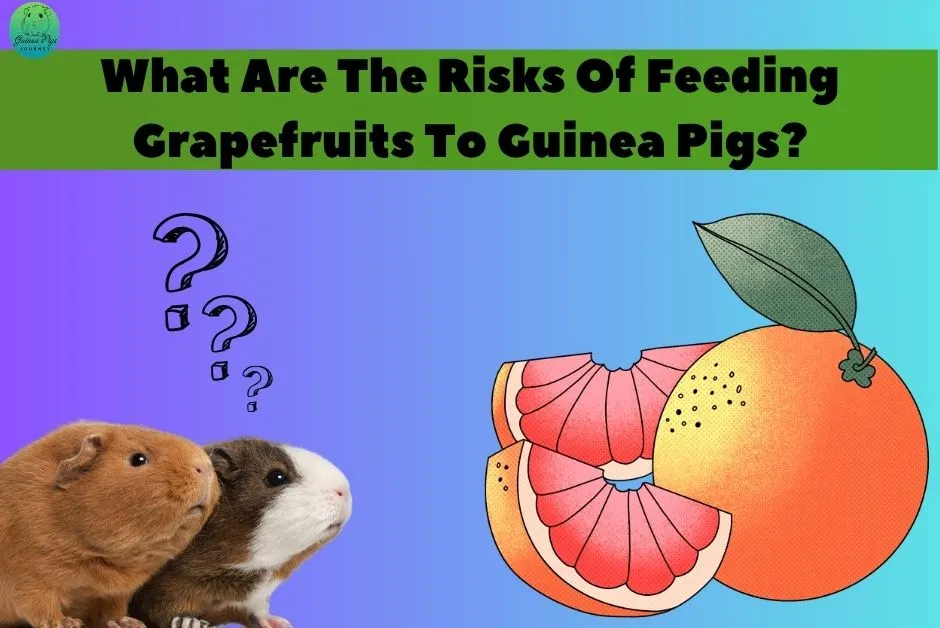
- Citrus sensitivity: Many fruits like grapefruit for guinea pigs may be citrus sensitive which can lead to digestive issues and skin irritations if not fed in moderation to guinea pigs.
- Acidity Concerns: Like humans with acidic reflux or sensitive stomachs, Guinea pigs may also experience discomfort or diarrhea after consuming highly acidic foods without moderation. The acidity in grapefruits may lead to digestive issues in guinea pigs. Furthermore, the acidic content in fruits like grapefruits, oranges, or pomegranates may also harm teeth, causing dental issues over time.
- Allergic Reactions: Grapefruit for guinea pigs may also develop allergies like itching, swelling, skin reactions, or respiratory issues in those guinea pigs who are not habitual of eating grapefruits. So, monitor and observe the reaction closely for any allergic signs like excessive gas, bloating, lethargy, restlessness, or loss of appetite. If you notice such signs of discomfort, stop feeding grapefruit to your furry friends and always consult with a veterinarian before introducing new foods to guinea pigs.
- Choking Hazard: Grapefruit for guinea pigs, if not chopped or sliced into small chewable pieces can pose a serious threat like a choking hazard for guinea pigs. Grapefruit seeds may also pose a choking hazard to your guinea pigs, so it is good to remove seeds before offering grapefruits to guinea pigs.
- Digestive Disturbance: Grapefruits may also pose a digestive issue in guinea pigs, especially those grapefruits that contain high water content. So, a Gradual introduction is the key to avoiding discomfort.
- Impact on Blood Sugar: Grapefruit for guinea pigs can also impact blood sugar levels because they contain a natural sugar although less than other fruits, that can lead to an imbalance in the digestive system that can result in gastrointestinal issues such as bloating and diarrhea, and primarily obesity and healthy weight which is a serious concern in guinea pigs’ health related issues like heart disease and diabetes. High sugar content can also disturb the immune system, which leads to imbalance and disturbs good and bad bacteria in guinea pig’s guts which harmful bacteria may generate and affect guinea pigs’ health. So, understanding the potential effects on blood sugar is essential for responsible pet ownership.
It’s very important to monitor individual guinea pigs closely when introducing grapefruits, considering their responses. If in doubt or if adverse reactions occur, consulting a veterinarian is the best course of action.
Frequency And Serving Size Of Grapefruit To Guinea Pigs
Always serve grapefruit for guinea pigs in moderation to ensure the better health and well-being of your furry friends. Here are some good tips on how to serve grapefruit for guinea pigs:
- Serving the size of grapefruit for guinea pigs: You may offer a single small slice or chopped grapefruit to ensure the moderation process that is safe from much sugar and acidity issues.
- Serve grapefruit for guinea pigs as a treat: Always remember that grapefruit should be served as a treat to your guinea pig’s diet. Not a daily part of the guinea diet.
- Frequency of serving grapefruit for guinea pigs: To avoid overconsumption and take nutritional benefits. It is recommended that; you feed grapefruits to your guinea once a week or less.
How To Prepare Grapefruit For Guinea Pigs:
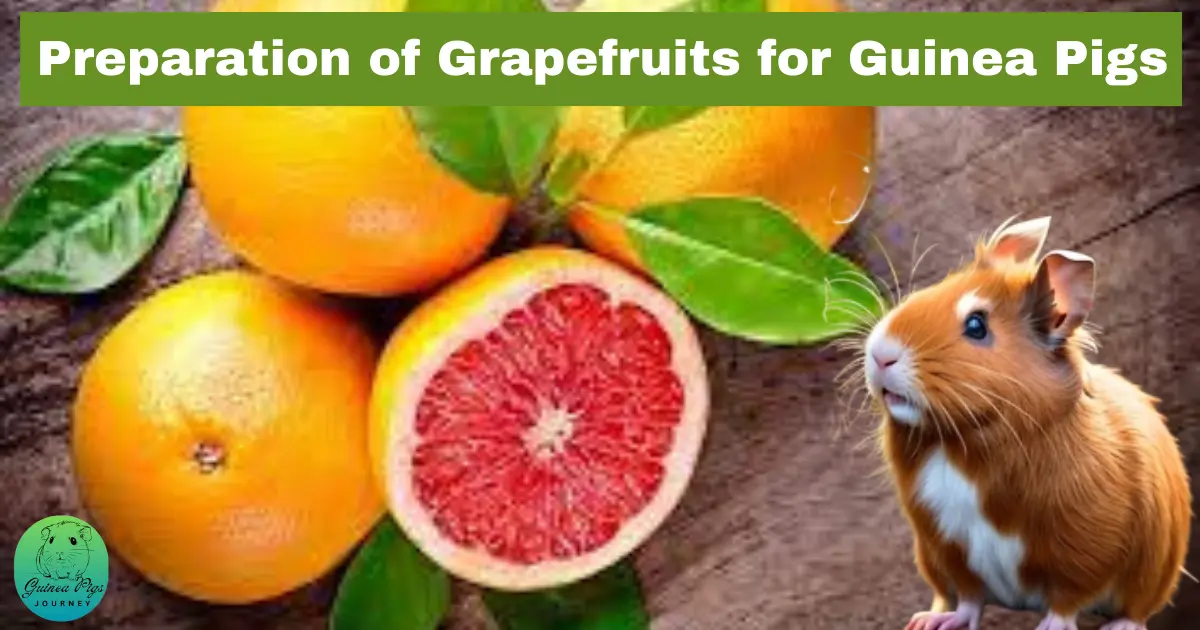
Before offering grapefruit for guinea pigs, it is very important to take some responsible steps to make it a beneficial and happy treat for your furry friends to ensure safety and remove pesticides and chemicals sprayed by storemen or during harvesting. Here are some key steps to consider while preparing grapefruit for guinea pigs:
Step-1: Purchase / Choose good quality: Always buy fruits from a verified store or verified dealer, so that you can have some good quality and fresh grapefruits for your guinea pigs.
Step-2: Wash the grapefruits: Thoroughly wash and clean the grapefruits in running water to remove the chemicals and pesticides.
Step-3: Peel and Slice Grapefruit into small pieces: Peel the grapefruits first after washing them properly and chop or slice the grapefruit into small chewable size pieces to avoid choking issues. But if you serve grapefruits with rind, there is no harm in it but observe first if your guinea pig likes it with rind or not.
Step-4: Remove seeds: remember to remove seeds before feeding grapefruits to your lovely pets to avoid choking issues.
Step-5: Introduce in appropriate quantity: You must feed grapefruits to your guinea pigs gradually and in small pieces and observe any reaction or sign before serving more or frequency of feeding. So that any kind of reaction may be avoided.
Step-6: Treat / Serve Grapefruit: You may also give grapefruits to your guinea pigs as a treat like feeding it with your hands or holding a guinea pig on a lap.
**Important Note: In the last when your guinea pigs are done eating grapefruit, remove the uneaten grapefruit from the cage or their surroundings to avoid the multiplication of bacteria and inviting flies that can be harmful to guinea pigs.
What Are The Alternatives To Grapefruit For Guinea Pigs?
Here are some delicious and safe alternatives that offer nutritional benefits without any potential drawbacks associated with grapefruits that our guinea pigs would enjoy:
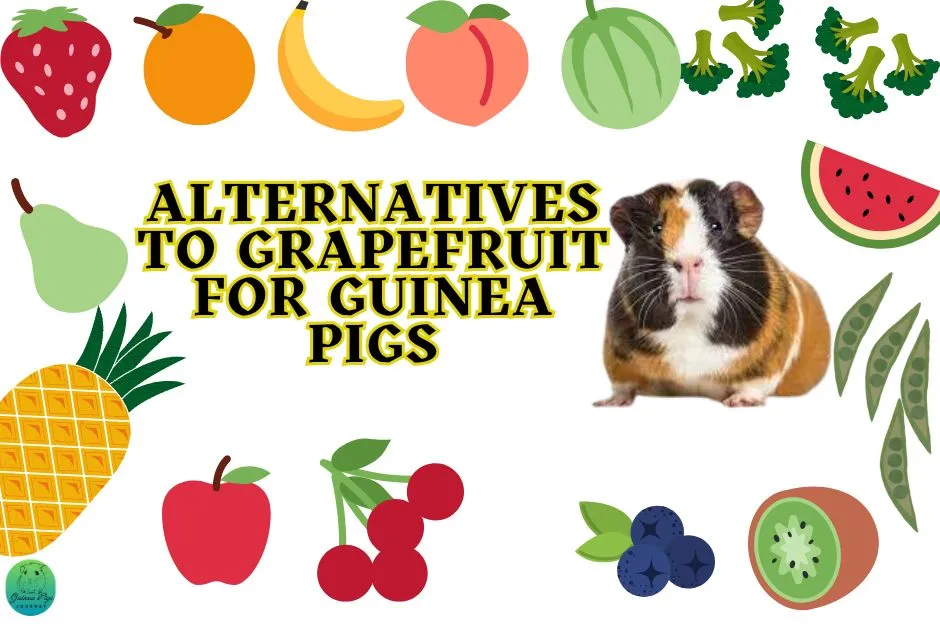
- Orange: To provide a suitable dose of Vitamin C, oranges can also be a good option and are generally well-tolerated by guinea pigs in moderation.
- Strawberries: For a healthy and tasty treat, rich in antioxidants and Vitamin C option, consider introducing strawberries into a guinea pig’s diet.
- Apple: After removing the seeds, cut into small and biteable pieces of apple and provide it to guinea pigs to enjoy their reaction.
- Blueberries: Blueberries full of antioxidants are loved by guinea pigs.
- Bananas: A good source of Potassium and Fiber for guinea pigs would enjoy.
- Melons (e.g. Watermelon, Cantaloup): Rind the melons and remove seeds before offering them to guinea pigs for better hydration options and deliciousness.
- Pears: To contribute to fiber intake in guinea pigs, slice the pears and remove the seeds to feed guinea pigs.
Some other fruits may include:
| Peaches | Raspberries | Nectarine | Grapes (Seedless) |
| Honeydew | Cherries (Pitted) | Cherries | Dragon Fruit |
| Kiwi | Blueberries | Apricots | Blackberries |
When introducing any new food, including these alternatives, start with small portions to ensure your guinea pig tolerates them well. Always remove seeds, pits, and any inedible parts before offering. Variety is key to a guinea pig’s diet, so feel free to rotate these treats to keep things interesting for your furry friend. If in doubt, for any allergic reaction or behavioral change, contact a veterinarian for further experienced guidance to avoid any hazardous situation.
KEYNOTES:
- Always offer grapefruits to guinea pigs in moderation.
- You can serve grapefruits as an occasional treat to guinea pigs.
- Grapefruit rich in nutrients can help in better digestion, prevent scurvy, better immune system, etc.
- You can serve grapefruits gradually and monitor or observe the reaction or any adverse signs.
- When in doubt, give a call to a professional veterinarian for guidance.
Frequently Asked Questions (FAQ’s)
Can guinea pigs eat grapefruit?
Yes, with moderation you can offer grapefruits in guinea pigs’ diet as a treat, but introduce it gradually and monitor or observe the reaction while feeding grapefruits.
Can Guinea pigs eat citrus fruit?
Yes, Guinea pigs can eat citrus fruits with moderation and gradual introduction in their diet but those with high acidity must be avoided like lemons.
Can guinea pigs eat Grapefruit rind?
Yes, Guinea pigs can eat the rind, but it is a bit tough for them to bite and chew it and it may also cause choking issues while eating the rind, it is recommended to peel off the rind first and serve the fruit to guinea pigs, or cut the rind into small chewable pieces before serving.
Can Pup (baby guinea pigs) eat Grapefruits?
Yes, Pups (baby guinea pigs) can eat grapefruits. Once pups are three months old, they stop feeding from mother milk and can eat solid food, so wait until three months before offering any solid diet to pups.


